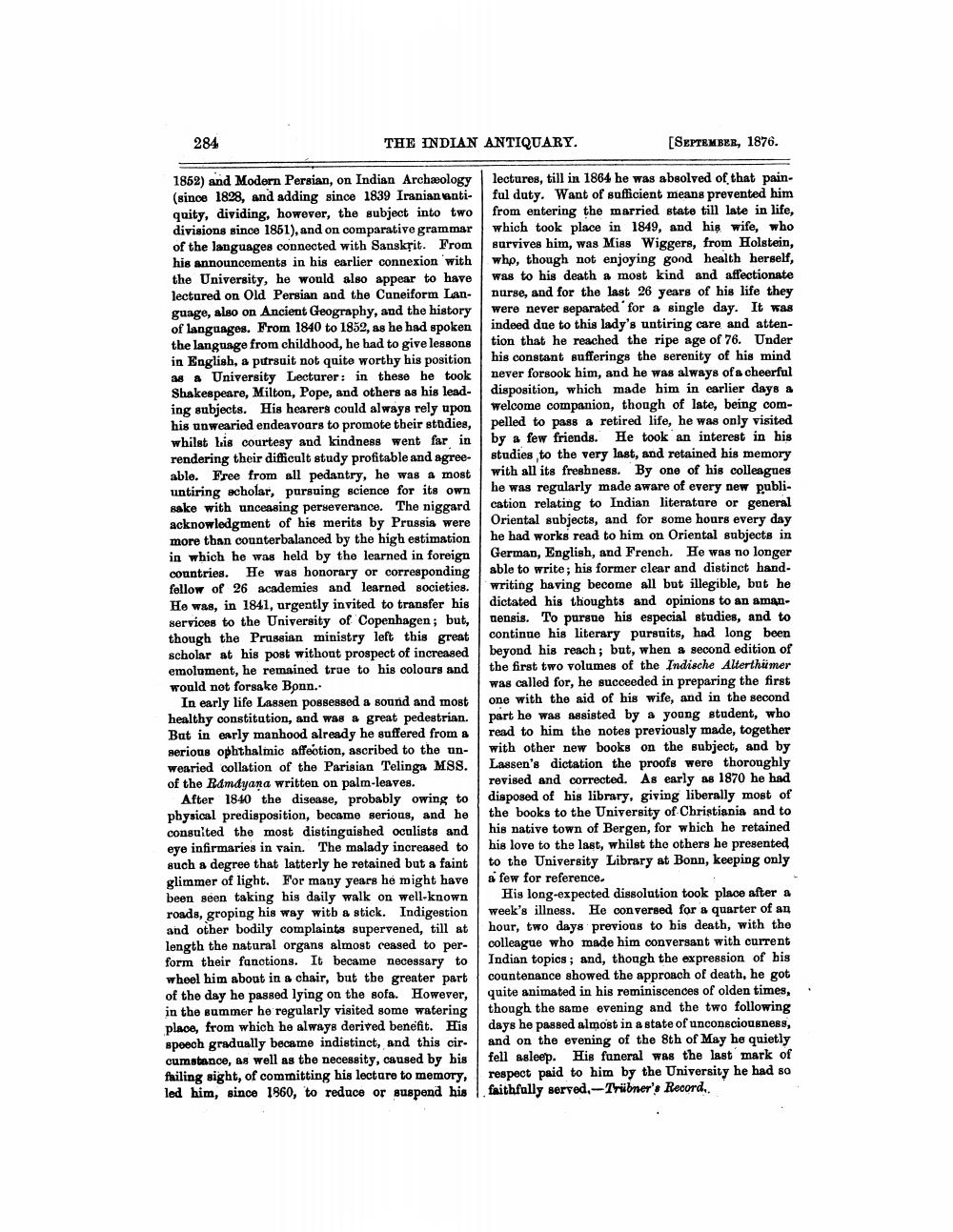________________
284
THE INDIAN ANTIQUARY.
[SEPTEMBER, 1876.
1852) and Modern Persian, on Indian Archæology lectures, till in 1864 he was absolved of that pain. (since 1828, and adding since 1839 Iranian anti- ful duty. Want of sufficient means prevented him quity, dividing, however, the subject into two from entering the married state till late in life, divisions since 1851), and on comparative grammar which took place in 1849, and his wife, who of the languages connected with Sanskrit. From survives him, was Miss Wiggers, from Holstein, his announcements in his earlier connexion with whp, though not enjoying good health herself, the University, he would also appear to have was to his death a most kind and affectionate lectured on Old Persian and the Cuneiform Lan- nurse, and for the last 26 years of his life they guage, also on Ancient Geography, and the history were never separated for a single day. It was of languages. From 1840 to 1852, as he had spoken indeed due to this lady's untiring care and attenthe language from childhood, he had to give lessons tion that he reached the ripe age of 76. Under in English, a pursuit not quite worthy his position his constant sufferings the serenity of his mind as a University Lecturer: in these he took never forsook him, and he was always of a cheerful Shakespeare, Milton, Pope, and others as his lead- disposition, which made him in earlier days a ing subjects. His hearers could always rely upon welcome companion, though of late, being comhis unweariod endeavoars to promote their studies, pelled to pass a retired life, he was only visited whilst his courtesy and kindness went far in by a few friends. He took an interest in his rendering their difficult study profitable and agree
studies to the very last, and retained his memory able. Free from all pedantry, he was a most
with all its freshness. By one of his colleagues untiring scholar, pursuing science for its own he was regularly made aware of every new publisake with unceasing perseverance. The niggard cation relating to Indian literature or general acknowledgment of his merits by Prussis were Oriental subjects, and for some hours every day more than counterbalanced by the high estimation he had works read to him on Oriental subjects in in which he was held by the learned in foreign
German, English, and French. He was no longer countries. He was honorary or corresponding able to write; his former clear and distinct handfollow of 26 academies and learned societies. writing having become all but illegible, but he He was, in 1841, urgently invited to transfer his dictated his thoughts and opinions to an amanservices to the University of Copenhagen; but, nensis. To pursue his especial studies, and to though the Prussian ministry left this great continue his literary pursuits, had long been scholar at his post without prospect of increased beyond his reach; but, when a second edition of emolument, he remained true to his colours and the first two volumes of the Indische Alterthümer would not forsake Bonn..
was called for, he succeeded in preparing the first In early life Lesen possessed a sound and most one with the aid of his wife, and in the second healthy constitution, and was a great pedestrian. part he was assisted by a young student, who But in early manhood already he suffered from a read to him the notes previously made, together serious ophthalmic affection, ascribed to the un- with other new books on the subject, and by wearied collation of the Parisian Telinga MSS. Lassen's dictation the proofs were thoroughly of the Ramdyana written on palm-leaves.
revised and corrected. As early as 1870 he had After 1840 the disease, probably owing to disposed of his library, giving liberally most of physical predisposition, became serious, and he the books to the University of Christiania and to consulted the most distinguished ocalists and his native town of Bergen, for which he retained eye infirmaries in vain. The malady increased to his love to the last, whilst the others he presented such a degree that latterly he retained but a faint to the University Library at Bonn, keeping only glimmer of light. For many years he might have a few for reference. been seen taking his daily walk on well-known | His long-expected dissolution took place after a roads, groping his way witb & stick. Indigestion week's illness. He conversed for a quarter of an and other bodily complaints supervened, till at hour, two days previous to his death, with the length the natural organs almost ceased to per- colleague who made him conversant with current form their fanctions. It became necessary to Indian topics; and, though the expression of his wheel him about in a chair, but the greater part countenance showed the approach of death, he got of the day he passed lying on the sofa. However, quite animated in his reminiscences of olden times, in the summer he regularly visited some watering though the same evening and the two following place, from which he always derived benefit. His days he passed almost in a state of unconsciousness, speech gradually became indistinct, and this cir. and on the evening of the 8th of May he quietly cumstance, as well as the necessity, caused by his fell asleep. His funeral was the last mark of failing sight, of committing his lectare to memory, respect paid to him by the University he had so led him, since 1960, to reduce or suspend his faithfully served. --Tribner'Record..




